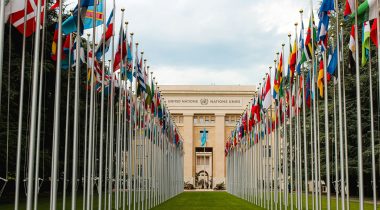
Rachel Etter-Phoya ■ African Ministers call for UN tax convention to protect against financial secrecy supplied by the richest nations

African Ministers call for UN tax convention to protect against financial secrecy supplied by the richest nations, as Africa improves in the Financial Secrecy Index 2022 – Tax Justice Network, Tax Justice Network Africa, Centre Régional Africain Pour le Développement Endogène et Communautaire
Yaoundé – Cameroon, 27th May 2022. Africa loses about US$ 90 billion per year in illicit financial flows, robbing the continent of resources to finance investment and development. Financial secrecy allows individuals to hide and move money out of the continent and the Financial Secrecy Index 2022, published by the Tax Justice Network, shows that the largest enablers of financial secrecy are some of the richest nations in the world, including the USA and Switzerland.
African leaders do not have an equal footing in setting international tax rules, which have been determined for over a century by a group of rich countries under the Organisation for Economic Co-operation and Development. This is why African Ministers of Finance, Planning and Economic Development adopted a resolution last week calling on the United Nations to begin negotiations on an international convention on tax matters.
The Financial Secrecy Index finds that all but 4 of the 18 countries assessed in the region – Rwanda, South Africa, Seychelles and Ghana – have made progress in improving financial transparency at home. None of the countries in the region is in the top 30 of financial secrecy suppliers in the world. On the contrary, several countries, such as Kenya and Nigeria, are in the top 20 of those that have improved their laws against the use of secretive financial practices by non-residents.
Half of the African countries assessed have also made significant progress in requiring disclosure of beneficial ownership of companies and more than half now have beneficial ownership laws in place. In addition, the capacity of tax administrations has improved or remained at the same level for all jurisdictions, and there are being great strides to improve international cooperation to prevent money laundering. Two countries – Ghana and Liberia – showed a worrying shift in the index, but this is mainly because they now offer more financial services to non-residents and not because they have introduced more secrecy services.
All African countries must take domestic action to prevent enabling illicit financial flows needed to finance sustainable development by improving corporate transparency obligations. This includes quick wins, like making all extractive industries contracts, tax rulings, and beneficial ownership information public. And requiring country by country reporting of multinational companies that are headquartered domestically and requiring subsidiaries of multinationals operating domestically to report on a country by country basis locally.
Most importantly, the index also reveals that Africa must continue its efforts to protect itself from its international partners. Five G7 countries alone – the US, UK, Japan, Germany and Italy – are responsible for cutting global progress against financial secrecy by more than half. African leaders must also continue to keep a close eye on Asian economic partners, including Singapore, Hong Kong, the United Arab Emirates and China, which have maintained or jumped up the rankings, both because of the increase in financial services they offer to non-residents and their financial and legal systems that enable financial secrecy.
The Financial Secrecy Index 2022 shows again that international tax rules cannot be set by the OECD, which members are some of the greatest enablers of financial secrecy. African leaders are right to call for a UN convention on tax to curb illicit financial flows and recover stolen assets. An inclusive, global approach to setting international tax rules is the only way Africa can stop its plunder from tax abuse.
Alvin Mosioma, Executive Director Tax Justice Network Africa:
“The results of this year’s Financial Secrecy Index highlight the problem of having the very same countries that are the leaders in the provision of financial secrecy be the very same countries that are spearheading the discussions on global tax reform. The Tax Justice Network Africa reiterates its support for the call by African governments for a tax convention that supports an intergovernmental tax body. Indeed, such a body is necessary to enable African countries to participate in global discussions on tax on an equal footing as all other countries.”
Alex Cobham, chief executive Tax Justice Network:
“The current international tax architecture is a disaster. It gives rise directly to needless inequalities between countries and within countries, denying everyone the chance for better lives. Lower income countries lose by far the largest share of their current tax revenues to cross-border tax abuse – the equivalent of nearly half their public health budgets. But lower income countries are also excluded from international cooperation and rule-setting. The Financial Secrecy Index 2022 shows the countries most responsible for enabling illicit flows, are the same countries setting the rules. The powerful joint call from African finance ministers brings the world a step closer to the international tax reforms that are desperately needed. It is crucial now that policymakers in other regions make their views clear, and that the United Nations accepts this mandate and begins negotiations urgently.”
Jean Mballa Mballa, Executive Director of CRADEC (African Regional Centre for Endogenous and Community Development):
“As a civil society active in the fight against illicit financial flows and tax justice, we are satisfied with Cameroon’s progress. We are particularly pleased by the efforts made with the ownership registration, the framework for more efficient tax administration, as well as the good behavior in international cooperation. However, we are still concerned about the management of transparency with respect to legal entities. Finally, we invite the authorities to be more vigilant, in view of the evolution of China, the country’s leading commercial partner, whose responsibility as well as that of two main jurisdictions affiliated to it (Hong Kong and Singapore) has increased sharply, with regard to the facilitation of financial secrecy.”
About the Financial Secrecy Index
The Financial Secrecy Index is produced biennially by the Tax Justice Network. It ranks each country based on how intensely the country’s financial and legal system allows individuals to hide and launder money extracted from around the world. The index grades each country’s financial and legal system with a secrecy score out of 100 where a score of 0 is full transparency and a score of 100 is full secrecy. The country’s secrecy score is then combined with the volume of financial services the country provides to non-residents to determine how much financial secrecy is supplied to the world by the country. The Financial Secrecy Index 2022 assesses 141 jurisdictions.
Contacts
| Tax Justice Network | Tax Justice Network Africa | Centre Régional Africain Pour le Développement Endogène et Communautaire |
|---|---|---|
| C/O Godfrey Wilson Ltd, 5th Floor Mariner House, 62 Prince Street, Bristol, England BS1 4QD [email protected] | P.O. Box 25112 – 00100 Nairobi, Kenya +254 20 2473373/ +254 728 279 368 [email protected] | Montée Zoé, Immeuble Express Union B.P 7199, Yaounde-Cameroon [email protected] |
Related articles
The elephant in the room of business & human rights
UN submission: Tax justice and the financing of children’s right to education
14 July 2025

How the UN Model Tax Treaty shapes the UN Tax Convention behind the scenes
The 2025 update of the UN Model Tax Convention
9 July 2025
One-page policy briefs: ABC policy reforms and human rights in the UN tax convention

The Financial Secrecy Index, a cherished tool for policy research across the globe

Vulnerabilities to illicit financial flows: complementing national risk assessments
UN Submission: A Roadmap for Eradicating Poverty Beyond Growth
A human rights economy: what it is and why we need it


